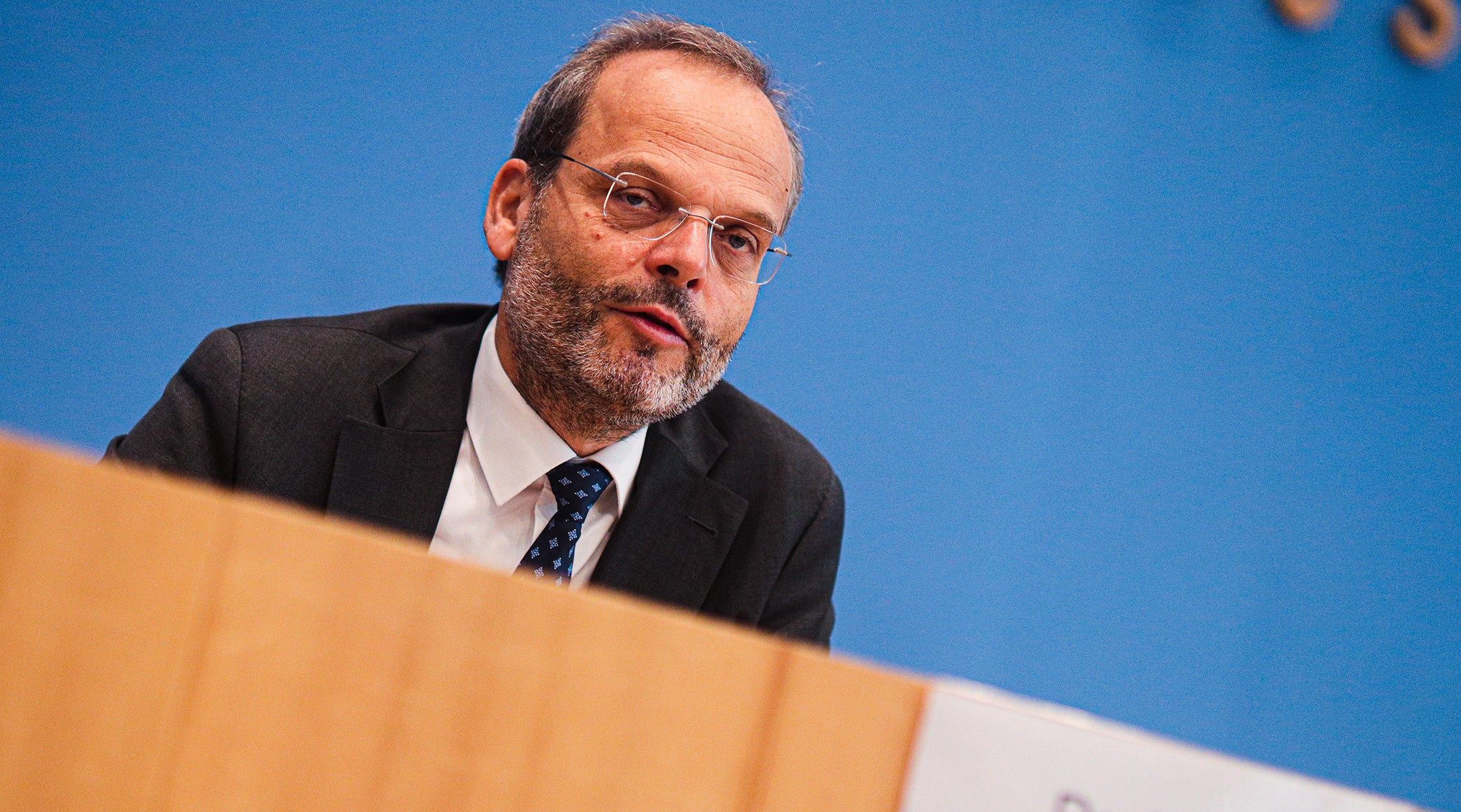Germany’s antisemitism czar says slogans like ‘From the river to the sea’ should be illegal
Felix Klein, who has held his position since 2018, says Oct. 7 changed everything

Felix Klein speaks during a press conference in Berlin, Nov. 8, 2022. Photo by Christian Marquardt/NurPhoto via Getty Images
(JTA) — Germany’s antisemitism czar has urged a law to ban pro-Palestinian slogans such as “From the river to the sea,” renewing a fraught debate over the country’s historic allegiance to Israel and freedom of speech.
Felix Klein’s initiative would ban chants that could be interpreted as calling for Israel’s destruction. His proposal has the support of German Interior Minister Alexander Dobrindt and is now being reviewed by the Justice Ministry, he told Haaretz on Wednesday.
“Before Oct. 7, you could have said that ‘From the river to the sea’ doesn’t necessarily mean kicking Israelis off the land, and I could accept that,” said Klein. “But since then, Israel has really been facing existential threats, and unfortunately, it has become necessary here to limit freedom of speech in this regard.”
Klein, the first holder of an office titled “Federal Government Commissioner for Jewish Life in Germany and the Fight against Antisemitism” since 2018, added that he believed the law must be passed even if it is challenged in court for violating free speech.
Hamas’ Oct. 7, 2023, attacks and the subsequent and devastating Israel-Hamas war in Gaza tore at the seams of Germany’s national doctrines. The war triggered a sharp rise in antisemitic and Isalmophobic incidents across the country. It also exposed charged questions about when Germany prioritizes its responsibility toward the Jewish state, which became central to German national identity after the Holocaust, and when it upholds democratic principles.
The legal boundaries of pro-Palestinian speech are already far from clear-cut. Currently, courts decide whether a person chanted “From the river to the sea, Palestine will be free” in support of peacefully liberating Palestinians or in endorsement of terrorism. In August 2024, the German-Iranian activist Ava Moayeri was convicted of condoning a crime for leading the chant at a Berlin rally on Oct. 11, 2023.
Shortly after the Hamas attacks, local authorities across Germany imposed sweeping bans on pro-Palestinian protests. Berlin officials authorized schools to ban the keffiyeh, a symbol of Palestinian solidarity, along with slogans such as “Free Palestine.”
Jewish and Israeli activists were caught up in the crackdown. In October 2023, a woman was arrested after holding a poster that said, “As a Jew and Israeli: Stop the genocide in Gaza.” And police prohibited a demonstration by a group calling themselves “Jewish Berliners against Violence in the Middle East,” citing the risk of unrest and “inflammatory, antisemitic exclamations.”
Earlier this year, German immigration authorities ordered the deportation of three European nationals and one U.S. citizen over their alleged activity at pro-Palestinian demonstrations. Three of the orders cited Germany’s “Staatsräson,” or “reason of state,” a doctrine enshrining Germany’s defense of Israel as justification for its own existence after the Holocaust.
But that tenet is not used in legal settings, according to Alexander Gorski, who represents the demonstrators threatened with deportation. “Staatsräson is not a legal concept,” Gorski told the Jewish Telegraphic Agency in April. “It’s completely irrelevant. It’s not in the German Basic Law, it’s not in the constitution.”
Jewish leaders such as Charlotte Knobloch, a Holocaust survivor and president of the Jewish Community of Munich and Upper Bavaria, have argued that anger toward Israel created a “pretext” for antisemitism. “It is sufficient cause in itself to fuel the hatred,” Knobloch said to Deutsche Welle in September.
In recent months, two German establishments made the news for refusing entry to Jews and Israelis. A shop in Flensburg, which posted a sign saying “Jews are banned here,” is vulnerable to German anti-discrimination law. Not so for the restaurant in Fürth whose sign read, “We no longer accept Israelis in our establishment,” according to anti-discrimination commissioner Ferda Ataman, who said the law does not apply to discrimination on the basis of nationality.
Klein said he has also initiated legislation to expand that law to protect Israelis and other nationalities.
He has a longstanding relationship with Jewish communities in Germany, starting with his Foreign Office appointment as the special liaison to global Jewish organizations. In that role, he helped create a “working definition” of antisemitism for the International Holocaust Remembrance Alliance in 2016. That definition has sparked contentious debate, as critics argue it conflates some criticisms of Israel with antisemitism.
Klein believes that anti-Zionism does largely fall in the same bucket as antisemitism. “I think in most cases it is — it’s just a disguised form of antisemitism,” he told Haaretz. “When people say they’re anti-Israel, what they really mean is Jews.”















